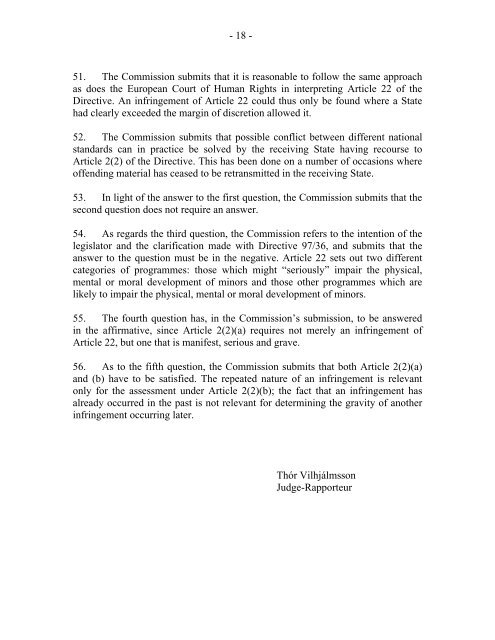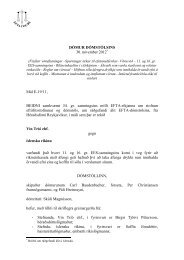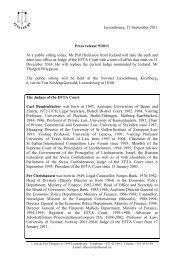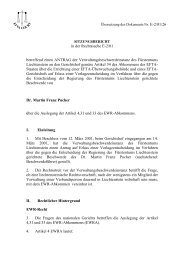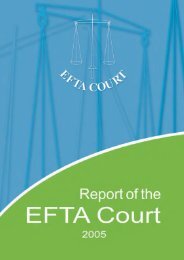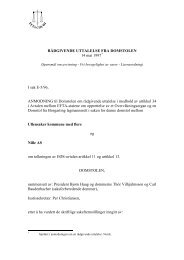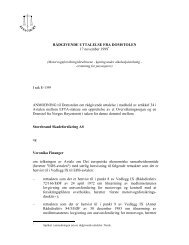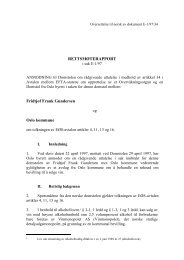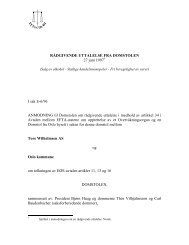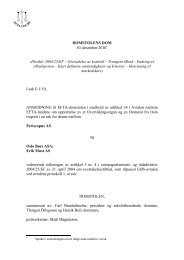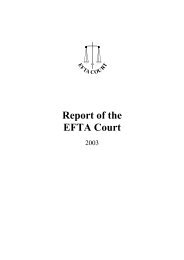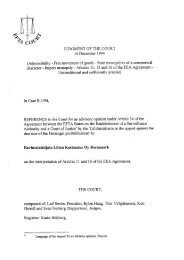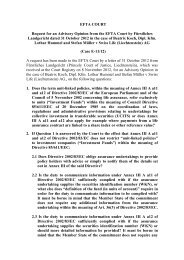Report for the Hearing in English - EFTA Court
Report for the Hearing in English - EFTA Court
Report for the Hearing in English - EFTA Court
Create successful ePaper yourself
Turn your PDF publications into a flip-book with our unique Google optimized e-Paper software.
- 18 -<br />
51. The Commission submits that it is reasonable to follow <strong>the</strong> same approach<br />
as does <strong>the</strong> European <strong>Court</strong> of Human Rights <strong>in</strong> <strong>in</strong>terpret<strong>in</strong>g Article 22 of <strong>the</strong><br />
Directive. An <strong>in</strong>fr<strong>in</strong>gement of Article 22 could thus only be found where a State<br />
had clearly exceeded <strong>the</strong> marg<strong>in</strong> of discretion allowed it.<br />
52. The Commission submits that possible conflict between different national<br />
standards can <strong>in</strong> practice be solved by <strong>the</strong> receiv<strong>in</strong>g State hav<strong>in</strong>g recourse to<br />
Article 2(2) of <strong>the</strong> Directive. This has been done on a number of occasions where<br />
offend<strong>in</strong>g material has ceased to be retransmitted <strong>in</strong> <strong>the</strong> receiv<strong>in</strong>g State.<br />
53. In light of <strong>the</strong> answer to <strong>the</strong> first question, <strong>the</strong> Commission submits that <strong>the</strong><br />
second question does not require an answer.<br />
54. As regards <strong>the</strong> third question, <strong>the</strong> Commission refers to <strong>the</strong> <strong>in</strong>tention of <strong>the</strong><br />
legislator and <strong>the</strong> clarification made with Directive 97/36, and submits that <strong>the</strong><br />
answer to <strong>the</strong> question must be <strong>in</strong> <strong>the</strong> negative. Article 22 sets out two different<br />
categories of programmes: those which might “seriously” impair <strong>the</strong> physical,<br />
mental or moral development of m<strong>in</strong>ors and those o<strong>the</strong>r programmes which are<br />
likely to impair <strong>the</strong> physical, mental or moral development of m<strong>in</strong>ors.<br />
55. The fourth question has, <strong>in</strong> <strong>the</strong> Commission’s submission, to be answered<br />
<strong>in</strong> <strong>the</strong> affirmative, s<strong>in</strong>ce Article 2(2)(a) requires not merely an <strong>in</strong>fr<strong>in</strong>gement of<br />
Article 22, but one that is manifest, serious and grave.<br />
56. As to <strong>the</strong> fifth question, <strong>the</strong> Commission submits that both Article 2(2)(a)<br />
and (b) have to be satisfied. The repeated nature of an <strong>in</strong>fr<strong>in</strong>gement is relevant<br />
only <strong>for</strong> <strong>the</strong> assessment under Article 2(2)(b); <strong>the</strong> fact that an <strong>in</strong>fr<strong>in</strong>gement has<br />
already occurred <strong>in</strong> <strong>the</strong> past is not relevant <strong>for</strong> determ<strong>in</strong><strong>in</strong>g <strong>the</strong> gravity of ano<strong>the</strong>r<br />
<strong>in</strong>fr<strong>in</strong>gement occurr<strong>in</strong>g later.<br />
Thór Vilhjálmsson<br />
Judge-Rapporteur


